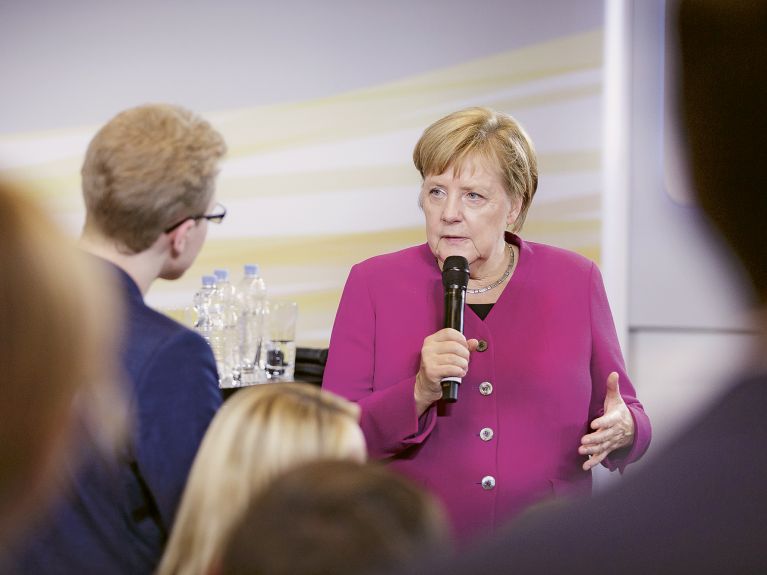Commitment to a citizens’ Europe
At a citizens’ dialogue event the Federal Chancellor answers people’s questions and explains what Europe means to her.

Dialogue with citizens? Exchange among equals? Can you expect that from an event at which the Federal Chancellor asks people to come and talk? This question already arises while people are waiting for the German government leader to arrive in Hanover on this day in early autumn. Here, at the corporate headquarters of Continental, the automotive supplier, the atmosphere is already rather strained when the Federal Chancellor enters. Merkel is accompanied by a retinue of staff and security personnel. The official welcome photographs are quickly taken – and soon afterwards the Chancellor stands in front of a group of mainly young people and says: “But now we must hear someone from the project.”
The group in Hanover experiences a Federal Chancellor who is not afraid of making direct contact: she is not only attentive and relaxed, but also focused. Angela Merkel has come to listen – and discuss. And she is not only doing this in Hanover; citizens’ dialogue events have already been held with Merkel in Berlin and Jena under the motto “Let’s talk about Europe”. The “project” that she wanted to find out more about in Hanover is called Experiencing Europe and is based on an initiative at Continental. A total of eight participating companies now offer unemployed young Germans short internships in neighbouring European countries. “We want to draw attention to promising but unfamiliar jobs and simultaneously inspire enthusiasm for Europe,” says Ariane Reinhart, the member of the Executive Board at Continental responsible for human resources. “That works best through personal experience of Europe and meeting other Europeans.” A large proportion of the young people present in Hanover have something to report on this subject.

“I didn’t know Europe,” says a young man a little shyly. He completed his internships at Continental in Hungary and Romania, and he was surprised at how far technological modernisation has advanced in the two countries. Another Experiencing Europe participant tells everyone about her time in Romania and how unequal wage levels in Europe trouble her. Many are worried about the forthcoming Brexit and have concerns that the cohesion of Europe is disintegrating. What will the relationship be like between the European Union and the United Kingdom? “Based on friendship, as close as possible, and as close as the British want it to be,” answers the Federal Chancellor.
Solidarity and cohesion
The Federal Government citizens’ dialogue programme cannot solve the problems of the European Union. Nevertheless, it points to a kind of politics that does not only look inwards on itself, but seeks dialogue with ordinary people. Questions of European unity were at the centre of the Federal Foreign Office events: How can we make European Economic and Monetary Union crisis-proof? How can Europe address the refugee and migrant problem on a basis of solidarity? What does a successful Common Foreign and Security Policy look like? The Federal Chancellor also gets down to basics when she is asked about European values.
Continent of tolerance
“Democracy is more than just going to elections and someone wins,” says Merkel. “Democracy means that minorities have rights, that there are independent courts and an independent press.” Merkel regards Europe as “a continent of tolerance” that must also continue to uphold the freedoms that characterise it – from freedom of opinion to freedom of religion.
At the citizens’ dialogue event in Jena the Chancellor focused on fundamental issues. In the European Union, as elsewhere, all actors need to pay attention to not being “careless” when it comes to preserving the peace. In Jena she referred to Franco-German cooperation as an example of an enduring peace project. However, she added, this also needed to be cultivated from one generation to the next, and that would not happen without commitment.
Taking citizens seriously
Beyond the big ideas, many personal encounters are what bring Europe together. Hasan Ilhan, a 20-year-old from Hesse, stopped studying soon after completing his university entrance exams. “Experiencing Europe then gave me the opportunity to prove myself,” he explains. First he completed an internship in Jičín, Czech Republic, and then in Rambouillet near Paris, France. There the young man was able to live with the family of his French human resources manager. She was the person who gave Hasan Ilhan the reference with which he was able to successfully apply for a commercial trainee programme in Frankfurt am Main.
How did he find the citizens’ dialogue? “I was very pleased as a citizen to be taken so seriously by the Federal Chancellor,” says Hasan Ilhan. The internships kindled his desire for more: he would like to get to know far more European cultures. Had Germany’s head of government won him over? “I trust her to stand up for Europe.”
Newsletter #UpdateGermany: You would like to receive regular information about Germany? Subscribe here to:
